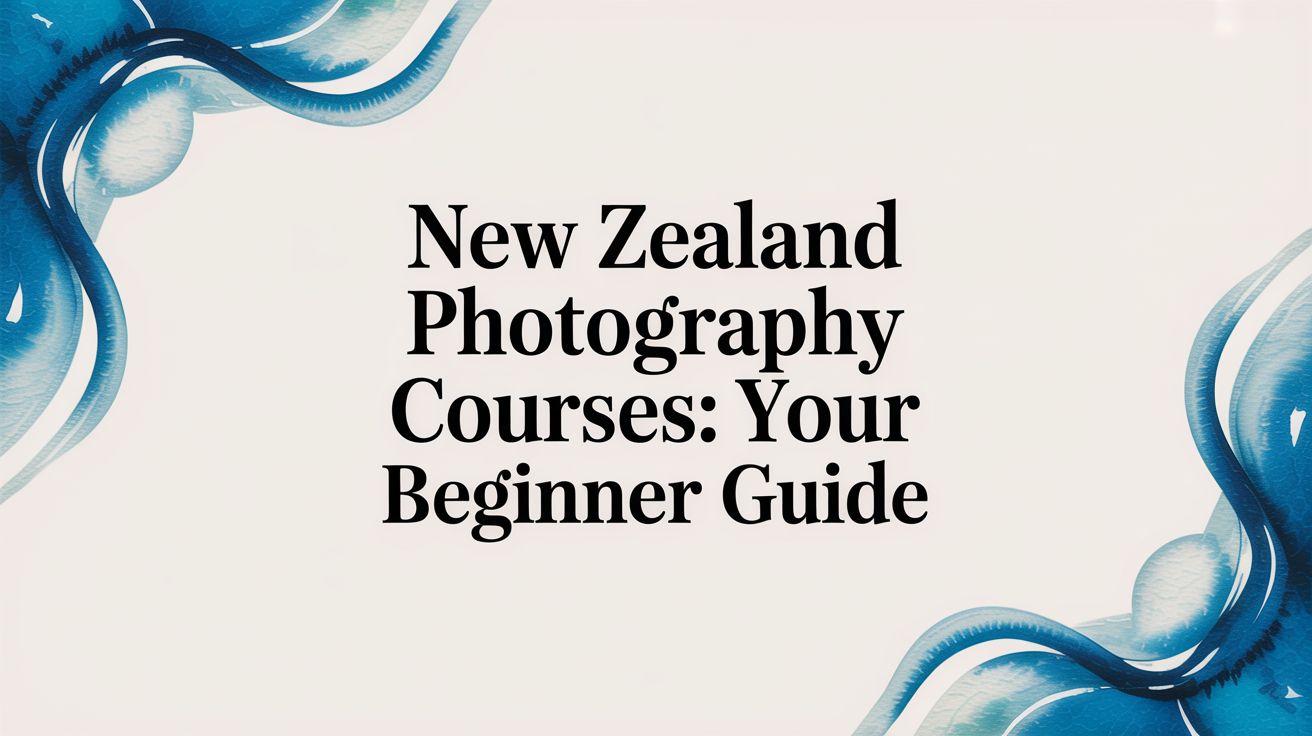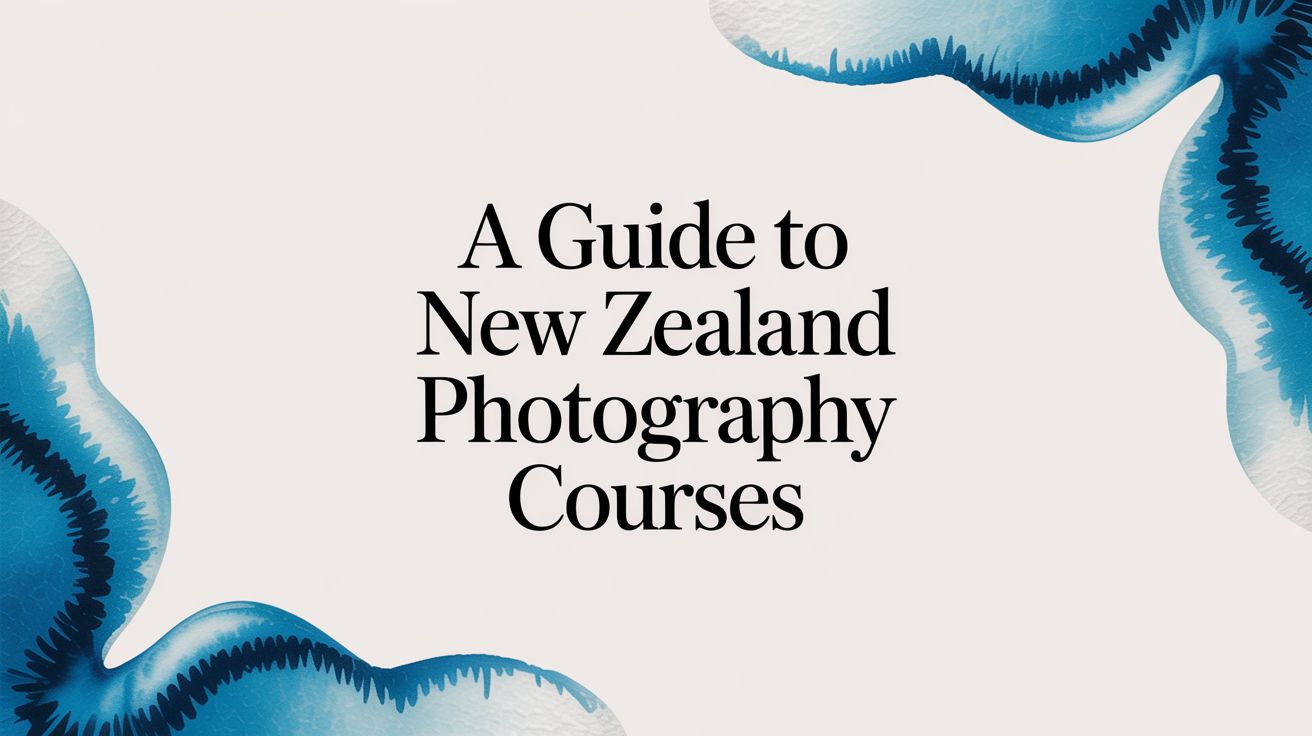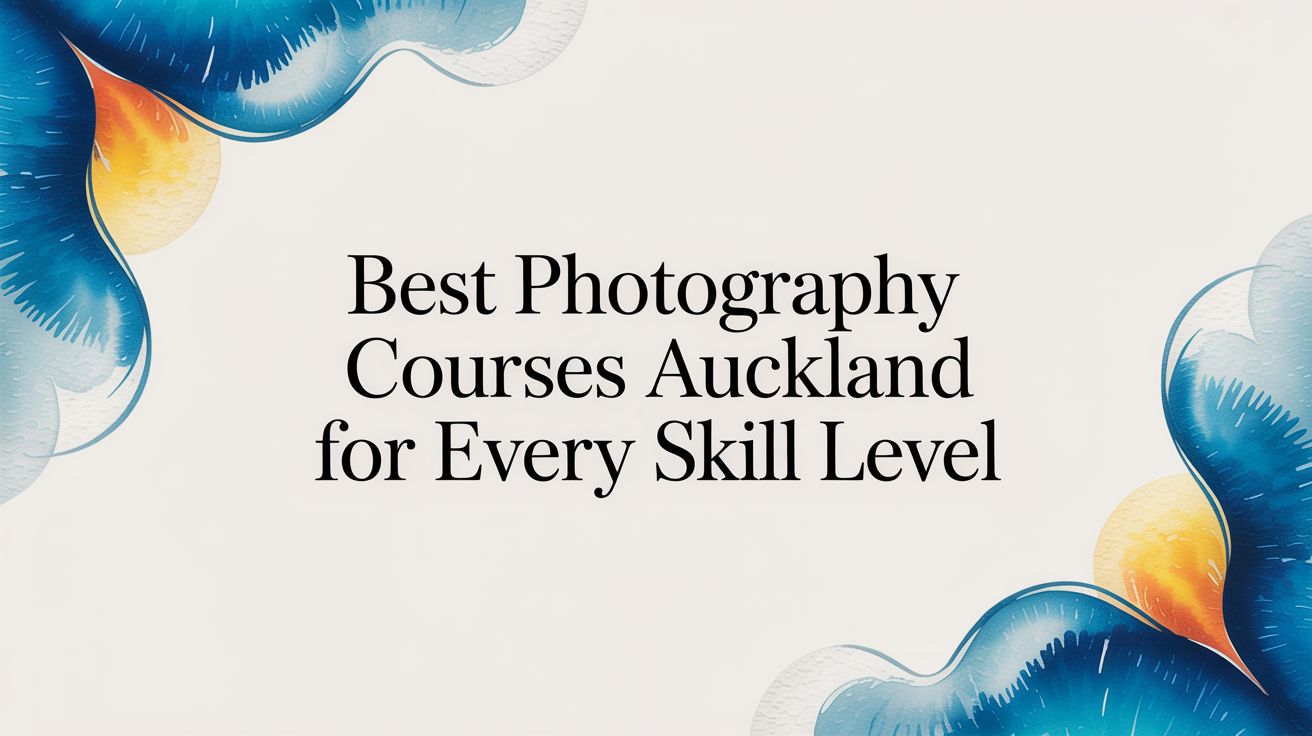
Best Photography Courses Auckland for Every Skill Level
Trying to find the best photography courses in Auckland can feel like you're spoiled for choice, but figuring out the right path really just comes down to your personal goals. Whether you’re looking for an intensive weekend workshop or a flexible online programme to build your skills from scratch, the perfect option is out there.
Finding the Right Photography Course in Auckland

Maybe you dream of capturing Auckland’s incredible landscapes, or perhaps you're aiming to kickstart a whole new creative career. Either way, the first step is getting your head around the different types of training available. This guide is all about practical, skills-based learning—the kind that builds your portfolio and your confidence without locking you into a long-term university degree.
We'll dive into the vibrant world of photography education right here in Auckland, helping you tell the difference between the various course formats. The goal is to find something that fits your schedule, budget, and creative vision like a glove. The journey from hobbyist to skilled photographer is an exciting one, and it all begins with making the right choice.
Charting Your Creative Path
Think of your photography education like building a toolkit. You don’t need every single tool right away—just the right ones for the job you want to do. Luckily, the learning options in Auckland are designed to meet you exactly where you are.
- For the Absolute Beginner: Just starting out? A foundational course is your best bet. You’ll cover the essentials like camera settings, composition, and lighting, giving you the confidence to finally switch off that auto mode.
- For the Developing Hobbyist: If you've got the basics down but want to specialise, look for workshops or specific online modules. You could explore portraiture, landscape, or even astrophotography.
- For the Aspiring Professional: Is a creative career your end goal? Then you’ll need a course that helps you build a professional-quality portfolio. This usually means more structured, in-depth learning that covers advanced techniques and top-tier editing skills.
The best photography courses are the ones that give you practical, real-world abilities. In the creative industries, a strong portfolio and skills you can actually demonstrate are often far more valuable than a formal qualification alone.
This guide is here to help you navigate these choices. By focusing on skills-based training, you can find a flexible and effective path to hitting your photography goals. You can even explore a range of practical, skills-focused online photography courses designed to fit around your life.
Comparing Workshops, Online Courses, and Formal Degrees
Figuring out the right way to learn photography in Auckland is the first step toward your creative future. Think of a weekend workshop as a creative sprint—it's an intense, hands-on session designed to nail a specific skill, whether that’s portrait lighting or capturing dramatic cityscapes at night.
An online course, on the other hand, is more like a guided expedition. It lets you build your core knowledge and sharpen your creative eye over time, all on your own schedule. Then you have formal degrees, which are a full-on academic commitment to the craft.
There’s no single "best" choice here. It all comes down to what you need to hit your own photography goals. Let's break down what each path looks like.
The Power of the Weekend Workshop
Workshops are brilliant for targeted, immersive learning. They're usually short, running from a single afternoon to a full weekend, and laser-focused on one specific area of photography.
- Pros: Workshops give you immediate, hands-on experience with an expert looking over your shoulder. They're also fantastic for networking with other local photographers and getting instant feedback on your technique in a real-world Auckland setting.
- Cons: Because they’re so specific, workshops won’t give you the big picture. They’re a great top-up to your learning, not a complete education, and the cost can feel a bit steep for just a day or two of training.
The Flexibility of Online Courses
Online courses have become a go-to for aspiring photographers, and for good reason: they offer unmatched flexibility. These programmes are built to fit around your existing work or family commitments, so you don't have to put your life on hold to learn.
Online learning puts you in the driver's seat. You can go back over tricky topics, practise a technique until it’s second nature, and build a solid portfolio without the rigid deadlines of a traditional classroom.
A well-designed online course builds your skills logically, starting with the basics like your camera’s manual settings and moving all the way through to advanced editing techniques. This setup is perfect for self-starters who want a deep, practical understanding of photography from beginning to end. To see how different options stack up, take a look at our complete guide to New Zealand photography courses.
The Commitment of a Formal Degree
A formal degree from a university or polytechnic takes a deep, academic dive into photography. These are multi-year programmes that explore the history, theory, and critical analysis of the art form, right alongside the technical training. It's worth noting that many practical skills-based providers focus purely on getting you industry-ready rather than formal NZQA qualifications.
- Pros: A degree offers a highly structured learning environment, access to amazing facilities, and a solid theoretical grounding in art and photography.
- Cons: This path is a huge investment of both time and money. It’s the least flexible option by a long shot and might not even be necessary for a successful photography career, where a killer portfolio often speaks louder than a formal qualification.
How to Choose Your Auckland Photography Course
So, you’re ready to take the next step and invest in your photography skills? That's awesome. But with Auckland's vibrant creative scene, picking the right course can feel a bit overwhelming. The key is knowing what to look for, so let's break it down and find a programme that truly clicks with your creative goals.
First things first, look past the shiny course title and get into the nitty-gritty of the curriculum. A genuinely great course doesn't just teach you the "how" – the technical camera settings and buttons. It dives deep into the "why," helping you develop the creative vision to bring your ideas to life. You'll want to find a course that covers fundamentals like mastering essential portrait lighting techniques so you can walk away with a real understanding of the craft.
This decision tree is a handy way to visualise which path might be the best fit for what you want to achieve.
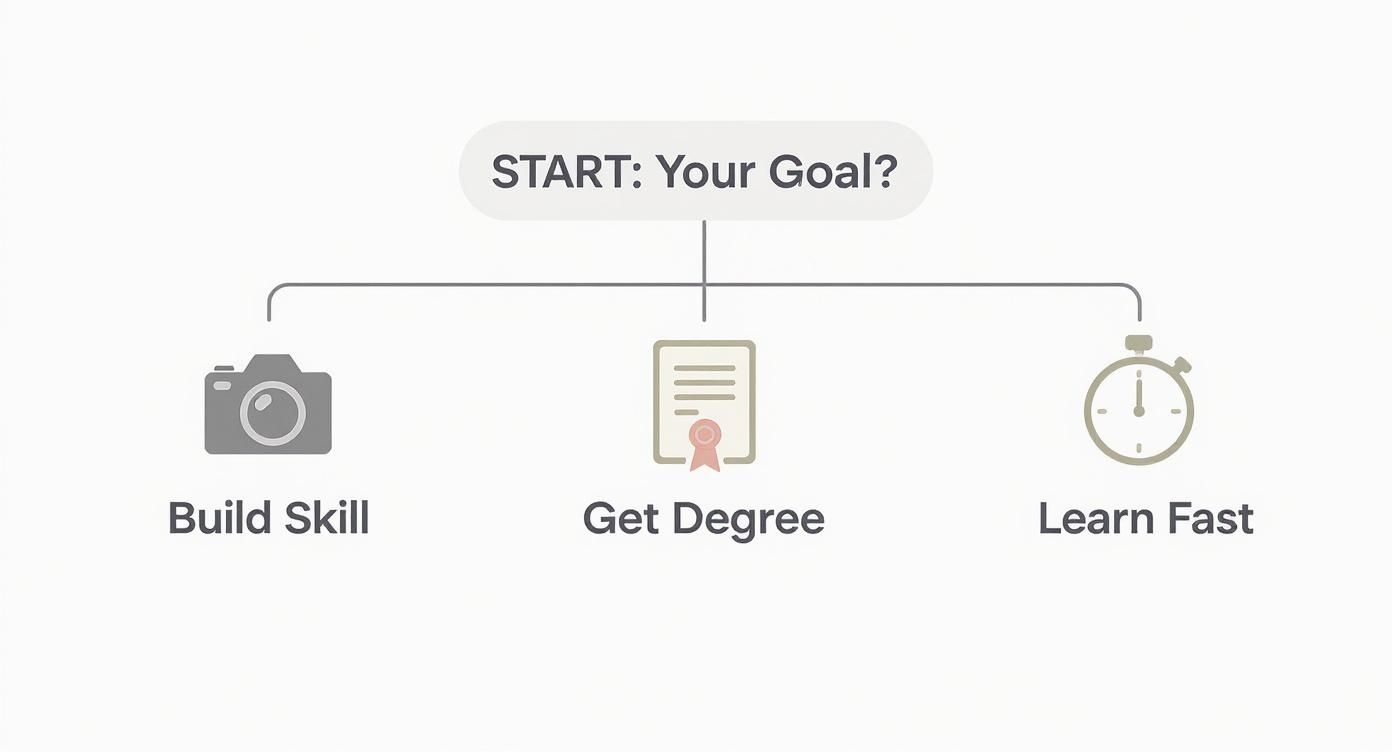
As you can see, your personal goals are the real starting point for figuring out which learning pathway makes the most sense for you.
Portfolio vs Paperwork
It’s really important to get your head around the difference between skills-based training and a formal NZQA qualification. While a traditional degree certainly has its place, a successful creative career often comes down to your portfolio and what you can actually do, not just a certificate. In Auckland’s fast-moving creative industries, your ability to deliver is what gets you hired.
In photography, your portfolio is your resume. A course that helps you build a strong, diverse body of work is an invaluable asset, demonstrating your skills to potential clients far more effectively than a certificate alone.
Many of the best photography courses Auckland has on offer come from skills-focused providers that aren't registered with NZQA. These organisations put all their energy into practical, job-ready training rather than ticking academic boxes. This approach means they can teach the very latest industry techniques, getting you out there creating professional-quality work much sooner.
Your Practical Checklist
As you start comparing your options, keep these key points in mind. A bit of homework now will save you a world of hassle later on.
- Instructor's Portfolio: Do you actually like the instructor's work? A great teacher should also be a skilled photographer whose style connects with what you want to learn.
- Student Testimonials: What are past students saying? Hunt for reviews that talk about the quality of the feedback, the hands-on nature of the projects, and the instructor's teaching approach.
- Practical Feedback: How is your work critiqued? A good course will offer you personalised, constructive feedback on your assignments, because that’s how you’ll grow and sharpen your eye.
In Auckland, photography education is a broad church. You can find everything from quick weekend workshops to multi-year university degrees, which is a great reflection of the city’s booming creative sector. Formal study can set you back anywhere from NZD 12,000 to NZD 40,000 a year. By using this checklist to evaluate your options, you can confidently pick a course that gives you real, tangible value for your investment.
In-Person Workshops vs Online Learning Flexibility
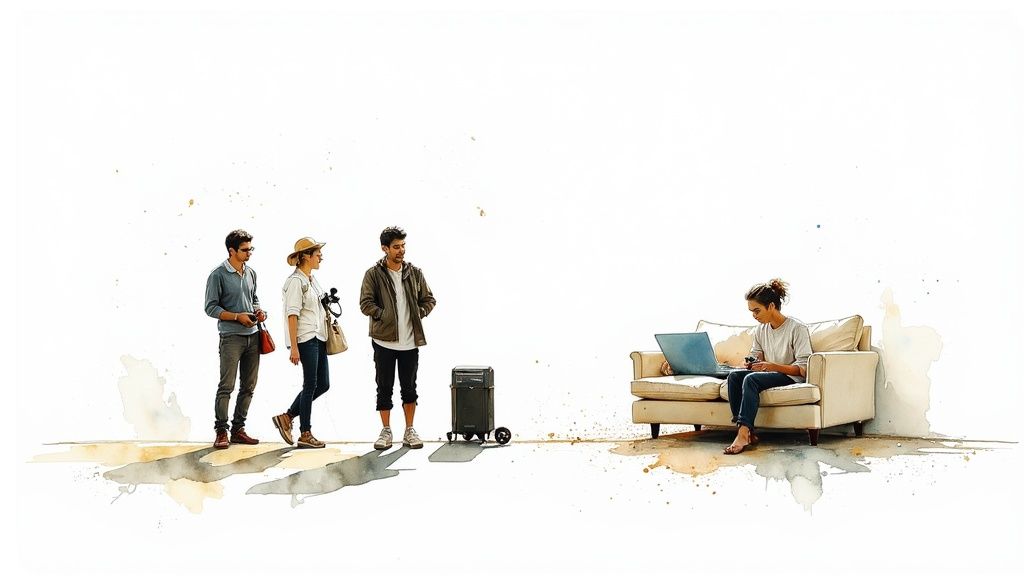
So, you're ready to learn photography in Auckland. The big question now is how. This often comes down to a classic choice: the focused, hands-on energy of an in-person workshop versus the incredible freedom of an online course.
One isn't better than the other; they just scratch different itches and fit different lives.
Think of an in-person workshop as a guided tour. You've got an expert right there with you, offering immediate, hands-on direction. It’s an amazing way to get real-time feedback while you’re actually shooting, whether that’s capturing the sunrise over Rangitoto or practising street photography down Karangahape Road.
That direct interaction is brilliant for getting your head around tricky concepts on the spot. You also get to connect with other local photographers, building a network from day one. The whole setup is structured to keep you focused, making it a powerful way to nail a specific skill in a short burst.
The Power of Self-Paced Learning
Online courses, on the other hand, are more like a self-drive adventure. You get the map and the keys, but you’re in complete control of the journey. For anyone juggling work, family, or other commitments, this flexibility is a total game-changer.
You could be learning the fundamentals of exposure at a local café on your lunch break, or mastering advanced editing from your living room after the kids are in bed. You set the pace. This means you can go back over complex topics as many times as you need until they finally click.
The real magic of online learning is that it fits around your life, not the other way around. It completely removes the barrier of a fixed schedule, making top-notch skills training accessible to anyone, no matter how packed their daily routine is.
This model also allows for a much deeper, more comprehensive curriculum than a weekend workshop ever could. You can build your knowledge progressively—from basic camera functions all the way to building a professional portfolio—on a timeline that actually works for you.
Comparing Your Learning Options
To figure out what’s right for you, it helps to see the core differences side-by-side. Your choice really depends on what you want to achieve and how you learn best.
In-Person Workshops in Auckland
- Best for: Immediate, hands-on feedback and networking with other local creatives.
- Pacing: Fast and intensive, usually crammed into a day or a weekend.
- Structure: Very structured, with a set schedule and location.
Online Photography Courses
- Best for: Ultimate flexibility, a comprehensive curriculum, and learning at your own speed.
- Pacing: Self-paced, letting you fit learning around your life.
- Structure: Flexible and modular, so you can learn from anywhere in Auckland or beyond.
Ultimately, the best photography courses Auckland has to offer are the ones that line up with your personal goals. If you crave instant feedback and a bit of social buzz, a workshop is a fantastic choice. But if you need a deep, practical education that fits seamlessly into your busy life, the freedom of an online course is pretty hard to beat.
Building Your Photography Career in Auckland
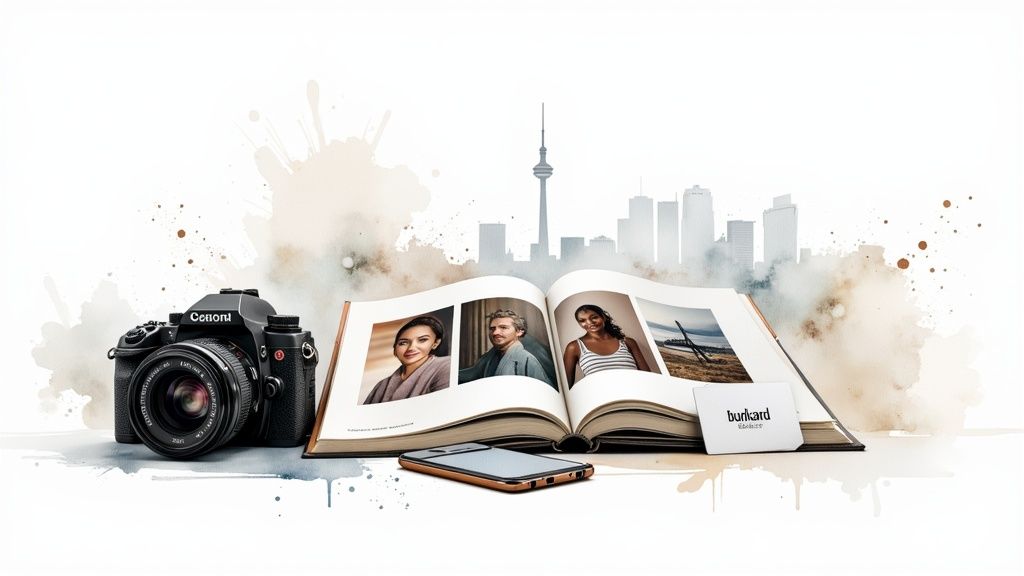
Finishing one of the many photography courses Auckland has on offer is a massive achievement, but really, it's just the first frame of your creative journey. The real magic happens when you connect those freshly sharpened skills to the opportunities waiting in Auckland's vibrant and ever-growing creative scene.
Your training swings open doors to a whole range of exciting career paths that stretch far beyond the traditional studio setup. Just think about the variety of roles right here in our city—from slick commercial product shoots for local Kiwi brands to capturing the unfiltered joy of weddings and big events.
Pathways to a Creative Career
Auckland’s creative economy is crying out for skilled visual storytellers. The right course doesn't just teach you about f-stops and shutter speeds; it gets you ready for these specific roles, turning your passion into a proper career or a profitable side hustle.
So, where could your new skills take you? Consider these potential pathways:
- Commercial and Product Photography: Local businesses are always on the hunt for top-notch images for their websites and marketing campaigns.
- Wedding and Event Coverage: This is a huge market in Auckland. You get to be part of people’s most important moments and tell their stories.
- Real Estate Photography: With a buzzing property market, there’s a constant need for photographers who can make a listing pop online.
- Social Media Content Creation: Brands need a non-stop stream of engaging visuals, creating ongoing work for photographers with a fresh, modern eye.
If you're thinking about picking a specialty after your course, getting insights into a specific niche can be a game-changer. For example, learning how to become a wedding photographer can set you on a very specific, and rewarding, path. A focused weekend workshop might spark a new side business in portraiture, while a comprehensive online course could give you the killer portfolio you need to go full-time freelance.
The goal of practical skills training isn’t just to teach you how to use a camera; it’s to give you the confidence and the portfolio to step straight into New Zealand's creative industries and start earning.
The Value of Skills-Based Training
Here in New Zealand, practical, skills-based education makes a real difference. The data on vocational training shows that graduates see tangible financial benefits and better employment rates over time.
For instance, median earnings for visual arts graduates with diplomas start around NZD 44,000 one year after study, climbing to NZD 53,000 within five years. Employment rates also see a healthy jump, hitting about 52% two years after finishing a course. It just goes to show the real-world value of these qualifications.
Enrolling and Maximising Your Learning Experience
So, you’ve sifted through the photography courses Auckland has on offer and picked the one for you. Brilliant! The next step is making sure you squeeze every drop of value out of that investment. A little prep work before your first day can be the difference between passively soaking up info and actively mastering new skills.
First things first, set some clear, achievable goals. What do you really want to get out of this? Is it finally conquering manual mode? Nailing your portrait lighting? Or maybe it's about building a landscape portfolio that truly wows. Having a solid "why" is what will keep you fired up and focused when things get tricky. It's also a smart move to get reacquainted with your camera's basic functions—things like shutter speed, aperture, and ISO—so you can hit the ground running.
Making the Most of Your Chosen Format
How you approach your learning will look a bit different depending on whether you’ve signed up for a hands-on workshop or a flexible online programme.
- For workshop attendees: Show up ready with a few specific questions for your instructor. Don't be shy during breaks, either—chat with your fellow photographers! Those connections can be gold for getting feedback and even finding people to collaborate with down the track.
- For online learners: Discipline is your best friend. Carve out a consistent practice schedule and, most importantly, stick to it. Make sure you get involved in any online forums or student communities. Sharing your work and getting constructive criticism is how you’ll grow.
This kind of proactive approach is absolutely vital for self-paced programmes. For instance, our comprehensive Advanced Photography Course Bundle is structured to build your skills from the ground up, but it’s your engagement that truly brings the lessons to life.
Maximising your learning isn't just about showing up. It's about diving in headfirst, practising relentlessly, and connecting with the material on a deeper level. That’s the mindset that turns knowledge into a genuine, tangible skill.
Thankfully, many providers are focused on making photography education more accessible. A great example is The New Zealand Diploma in Photography (Level 5) at the Southern Institute of Technology. They offer flexible study options—one year full-time or up to four years part-time—and their participation in the NZ Zero Fees Scheme for eligible students is a game-changer. It really highlights how quality education can be within reach, breaking down financial barriers for aspiring creatives. You can check out more details about their accessible photography diploma on their website.
Got Questions About Photography Courses in Auckland?
Jumping into the world of creative education can feel like a big step, and it’s natural to have a few questions. To help you feel totally confident in your choice, we’ve put together answers to the queries we hear most often from aspiring photographers in Auckland.
Think of this as your quick-start guide to the practical side of things before you enrol.
Do I Need a Super Expensive Camera to Get Started?
Absolutely not. It's a common myth that you need professional gear right out of the gate. The truth is, the best camera to learn with is the one you already have.
A great photography course will teach you the stuff that really matters: composition, lighting, and how to tell a story with your images. These are the skills that make a great photographer, and they work with any camera. Many entry-level DSLR or mirrorless cameras are more than powerful enough to create stunning photos. Focus on mastering the principles first—you can always upgrade your kit later as your skills and confidence grow.
Are These Courses NZQA Accredited?
It’s important to know the difference between skills-focused training and a formal academic qualification. Providers like Prac Skills are all about giving you practical, industry-ready abilities that help you build a killer portfolio and gain real-world confidence.
Our courses aren't on the NZQA framework. Instead, we’re focused on providing job-ready skills that you can use immediately in Auckland's creative scene. We prioritise your portfolio over paperwork.
This approach lets us stay nimble and teach you the latest techniques without being tied down by a rigid academic curriculum.
How Much Time Do I Actually Need to Put In?
This really comes down to the course format and what you want to get out of it. A weekend workshop in person might mean you’re all-in for a full 16 hours, whereas a flexible online course lets you call the shots and set your own pace.
For online learning, a good rule of thumb is to set aside 3-5 hours a week. That gives you enough time to watch the lessons, get out there and do the practical assignments, and really take on board the feedback. It’s all about consistency, not cramming. At the end of the day, the more you practise, the faster you’ll develop your creative eye and technical skills.
Ready to turn your creative spark into a real-world skill? Prac Skills offers online photography courses designed for busy Kiwis just like you. Explore our courses and start building your portfolio today.
.webp)
